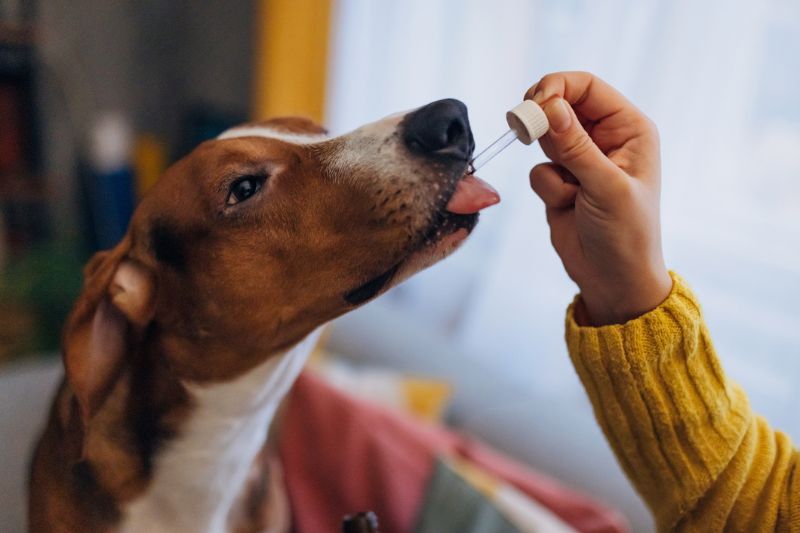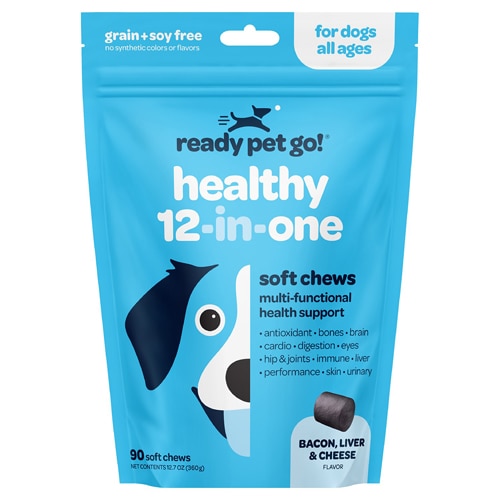[vc_row][vc_column][vc_column_text]Common digestive ailments like gastritis, irritable bowel disease and diarrhea can throw your dog's microbiome out of balance. Known as dysbiosis, this asymmetry between healthy and pathogenic bacteria is associated with disease, metabolic disorders and poor brain health.
Do dogs need
probiotics to support digestion and improve microbial balance? Research is still in the early stages, but the available evidence can help you decide whether a probiotic supplement is right for your pup.

Your dog's microbiome: a foundation for gut health
Just like in humans, the microbes in your dog's gut break down food to produce byproducts called metabolites. These metabolites—including short-chain fatty acids (SCFAs), amino acids, and vitamins—support the function of other body systems.
Healthy dogs have a
core group of gut microbes that includes:
- Firmicutes, SCFA producers that thrive on dietary fiber
- Bacteroidetes, which varies widely in abundance between dogs
- Fusobacterium, a genus of bacteria associated with colorectal cancer in humans, but that appears to be beneficial for dogs
- Proteobacteria, a phylum that contributes to important functions like protein metabolism
These microbes work together to suppress the growth of disease-causing microbes and prevent dysbiosis. Proper balance between the
number and types of gut microbes in dogs is associated with:
- Healthy immune cell function and production
- Reduced intestinal inflammation
- Healthy metabolism and weight
- Proper neurological function
Diet and the microbiome in dogs
The macronutrient content of your dog's diet can influence which microbes colonize the gut. Feeding a high-carbohydrate diet increases fiber-loving species like
Firmicutes; high-protein diets increase
Fusobacterium and other species that prefer protein.
Macronutrient sources may also be important for gut health. In one study, a diet based on low-quality protein meal caused dogs to
develop diarrhea. And dogs fed a natural diet of raw meat, bones and vegetables
in another study had more protein-digesting SCFA producers in their guts and greater overall microbial diversity than dogs fed commercial dog food.
High-fiber diets may also improve microbial diversity by increasing microbes that make SCFAs from carbohydrates. These microbes include genera like
Bifidobacterium and are associated with
better gut health and immune responses.
Regardless of diet, diseases that cause diarrhea and intestinal inflammation can rapidly
decrease diversity in your dog's gut, leading to dysbiosis, metabolic imbalances and reduced metabolite production.
Do dogs need probiotics to support gut health?
Dogs with diarrhea or irritable bowel disease (IBD) may benefit from probiotics. In one study, dogs with kennel stress-associated diarrhea improved after receiving a probiotic strain called
Bifidobacterium animalis AHC7. Probiotics in the
Lactobacillus and
Bifidobacterium genera appear to improve recovery time in cases of acute gastroenteritis, a condition characterized by intestinal inflammation, vomiting and diarrhea.
Other
probiotic strains and combinations have been shown to:
- Regulate diarrhea
- Modulate GI inflammation
- Increase SCFA production
- Support immune function
- Reduce pathogenic microbes like Clostridium
Probiotic mixes that include several strains appear to have
stronger effects than single strains. However, more research is needed to understand whether these effects make probiotics suitable as a clinical treatment for dogs.
Should you give your dog probiotics?
Although some probiotic strains show promise for
gut health in dogs, appropriate doses and strains are hard to determine from current research. Most studies also look only at probiotic bacteria. Other probiotics like fungi and yeast may also have benefits, as
one small study on the yeast
Saccharomyces boulardii suggests.
In the study, 20 dogs with chronic inflammatory gastrointestinal disease were given an
S. boulardii supplement along with traditional treatment for 60 days and showed greater improvement than dogs that didn't receive a probiotic.
Probiotic supplements appear to influence microbiome composition even in healthy dogs, but the effects aren't always positive. In some studies, probiotic supplements increased potentially harmful bacteria in dog's guts. Researchers continue to study probiotics to determine which species and strains are best for dogs.
When to use probiotics for dogs
So far, research suggests that probiotics may help if your dog has diarrhea. But since diarrhea can be a symptom of other, more serious, GI problems, always
talk with your vet first to determine the best course of action.
Feeding your dog mild, bland foods like cooked white rice, canned pumpkin and boiled potatoes can often
stop diarrhea without other treatment. If your dog is prone to gastrointestinal troubles or suffers from IBD, your vet may decide to recommend a probiotic for additional support.[/vc_column_text][/vc_column][/vc_row][vc_row][vc_column][vc_text_separator title="Featured Products" border_width="2"][vc_row_inner equal_height="yes" content_placement="middle" gap="35"][vc_column_inner width="1/3"][vc_single_image image="186215" img_size="full" alignment="center" onclick="custom_link" img_link_target="_blank" css=".vc_custom_1752094898183{padding-right: 7% !important;padding-left: 7% !important;}" link="https://www.vitacost.com/petcultures-daily-digestive-health-tribiotic-formula-pre-pro-postbiotic"][/vc_column_inner][vc_column_inner width="1/3"][vc_single_image image="173417" img_size="full" alignment="center" onclick="custom_link" img_link_target="_blank" css=".vc_custom_1709575730538{padding-right: 7% !important;padding-left: 7% !important;}" link="https://www.vitacost.com/natural-dog-company-super-flora-probiotic-supplement-for-dogs"][/vc_column_inner][vc_column_inner width="1/3"][vc_single_image image="173416" img_size="full" alignment="center" onclick="custom_link" img_link_target="_blank" css=".vc_custom_1709575754258{padding-right: 7% !important;padding-left: 7% !important;}" link="https://www.vitacost.com/probiora-pet-probiotics-for-your-dogs-mouth-30-servings"][/vc_column_inner][/vc_row_inner][/vc_column][/vc_row]




